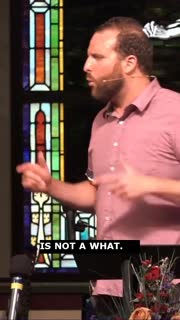Understanding the Trinity: God's Nature and Our Faith
Devotional
Sermon Summary
Bible Study Guide
Sermon Clips
### Quotes for Outreach
1. "Why is it important to have an accurate, true understanding of God? But there's some basic points of application that I think really flesh out just why this is so important and so applicably important. So one, the one that we've really already established from weeks leading up, I'll mention, is the fact that there is no end to the various gods that have been created by man. Where you look at the history of the world, any major civilization, empire, country, you name it, has had typically a pantheon of gods, right? You've got Greek gods, you've got Roman gods, you've got Norse gods, you've got Egyptian gods, and that's just naming four of the vast, and that's not even getting into Hinduism and the number of gods. That is in that belief. So right off the bat, we understand of why it's important to know who God is because from that point, we understand, okay, who is he not?" [05:08] (52 seconds)
2. "The God of the Bible has eternally existed as one God in three persons, Father, Son, and Holy Spirit. This is truly one of the facets of Christianity that we will never fully understand in this life or the next. There are some things that I believe that we don't understand this side of eternity that I believe we will understand on the other side of eternity. Then there are other things that I do not believe, regardless of what side of eternity we are on, that we will ever fully understand, this being one of them. Because the moment that you or I fully understand God is the moment that you and I ourselves are God. Let me just tell you, that moment's never going to happen." [16:40] (43 seconds)
3. "The concept of the Trinity is one of the reasons why other faiths like Islam claim us to be polytheists, belief in many gods, compared to monotheists, belief in one God. But notice, and I had Winona read this morning part of what is known in Judaism as the Shema. In Deuteronomy 6.4, Don't blow it past it. The Lord is one. So again, even though we're going to talk about three persons here shortly, he is, in fact, one." [19:20] (40 seconds)
4. "The Holy Spirit is not a what. He's a who. Okay? That's something that a lot of well-intentioned, well-meaning believers do, who they will say it when referring to Holy Spirit. The Holy Spirit is not an it. He is a who in the same way that the other two are. Now, another one, he's not a ghost, right? Whether it's certain older translations or certain hymns that sing about the Holy Ghost, he's not a ghost. He is not the remnant of a once living thing. He is as living as the Father and as the Son. So he's not an it. He's not a ghost." [31:36] (38 seconds)
5. "The Spirit gives every believer at least one spiritual gift. We see that in 1 Corinthians 12. And secondly, he illuminates believers to understand the meaning, the fixed meaning within Scripture. Interpretation, understanding, is not something that we bring to the Bible. The Bible reveals that to us. And the good thing is we're not in it alone. We aren't left to our human faculties to determine what Scripture means. The Holy Spirit, within us, shows us what the text means. Shows us the application of what we are to do with what we have just read." [37:05] (40 seconds)
### Quotes for Members
1. "Arguably more dangerous and more pressing to the believer than just understanding differentiating God from other gods is understanding and recognizing the distortions of God that we experience on a daily basis. Ascribing something to God that is not God. And you see, this is something we cannot afford to take lightly. Whether it is a distortion that we witness in others, an overt and intentional distortion, or a distortion unbeknownst to ourselves that we hold. That when aligning that with scripture, we see that our fundamental understanding of something is flawed. Because again, especially now, in some ways, I don't know if I would say it's easier for those who have been in the faith for a long time, others not, is when we're used to hearing something over and over again. We're used to a concept that is so familiar and again, so fundamental. Sometimes we take for granted what we understand and what we know." [05:08] (52 seconds)
2. "The essence of idolatry is the entertainment of thoughts about God that are unworthy of him. Wrong ideas about God are not only the fountain from which the polluted waters of idolatry flow, they are themselves idolatrous. The idolaters simply imagine things about God and to acts as if they were true. I'm going to read that one more time, especially if you don't have it in front of you, because there's a lot there and we're going to kind of hammer in on a lot of this. The essence of idolatry is the entertainment of thoughts about God that are unworthy of him. Wrong ideas about God are not only the fountain from which the polluted waters of idolatry flow, they are themselves idolatrous. The idolater simply imagines things about God and acts as if they were true." [08:06] (59 seconds)
3. "So if the God in someone's mind, in my mind, is that this is the same God as that God, then clearly the comprehension that I have of the Bible is not the same as the God of the Bible. So if the God of the Bible is not the same as the God of the Bible, then clearly the comprehension that I have of God is severely flawed. So these are just a couple of examples of why I hope we can see why this topic is so important. Why we cannot afford to get our concept, our understanding, our belief in God wrong. And so it is with this that we look into who is our God. Because of this importance, what can we learn? What can we know? What do we know of? Our God." [11:39] (45 seconds)
4. "The God of the Bible has eternally existed as one God in three persons, Father, Son, and Holy Spirit. This is truly one of the facets of Christianity that we will never fully understand in this life or the next. There are some things that I believe that we don't understand this side of eternity that I believe we will understand on the other side of eternity. Then there are other things that I do not believe, regardless of what side of eternity we are on, that we will ever fully understand, this being one of them. Because the moment that you or I fully understand God is the moment that you and I ourselves are God. Let me just tell you, that moment's never going to happen. The Bible is very clear on who God is. It is very clear on who you and I are. And so we always will never have a full understanding of who God is. But frankly, I find that to be a comforting notion, personally. Because again, why would I worship and serve someone that I can fully understand? Because if I can fully understand them, then what makes him God compared to me?" [16:40] (43 seconds)
5. "The Spirit gives every believer at least one spiritual gift. We see that in 1 Corinthians 12. And secondly, he illuminates believers to understand the meaning, the fixed meaning within Scripture. Interpretation, understanding, is not something that we bring to the Bible. The Bible reveals that to us. And the good thing is we're not in it alone. We aren't left to our human faculties to determine what Scripture means. The Holy Spirit, within us, shows us what the text means. Shows us the application of what we are to do with what we have just read. So this is just, again, not a complete list of the Holy Spirit's role in redemptive history and the Holy Spirit's role in our lives. To bring this to, to wrap things up, I'd be remiss if I didn't point out the biggest and most important moment, manner, that all three, all three persons work together in salvation." [37:05] (40 seconds)
Ask a question about this sermon
1. "Why is it important to have an accurate, true understanding of God? But there's some basic points of application that I think really flesh out just why this is so important and so applicably important. So one, the one that we've really already established from weeks leading up, I'll mention, is the fact that there is no end to the various gods that have been created by man. Where you look at the history of the world, any major civilization, empire, country, you name it, has had typically a pantheon of gods, right? You've got Greek gods, you've got Roman gods, you've got Norse gods, you've got Egyptian gods, and that's just naming four of the vast, and that's not even getting into Hinduism and the number of gods. That is in that belief. So right off the bat, we understand of why it's important to know who God is because from that point, we understand, okay, who is he not?" [05:08] (52 seconds)
2. "The God of the Bible has eternally existed as one God in three persons, Father, Son, and Holy Spirit. This is truly one of the facets of Christianity that we will never fully understand in this life or the next. There are some things that I believe that we don't understand this side of eternity that I believe we will understand on the other side of eternity. Then there are other things that I do not believe, regardless of what side of eternity we are on, that we will ever fully understand, this being one of them. Because the moment that you or I fully understand God is the moment that you and I ourselves are God. Let me just tell you, that moment's never going to happen." [16:40] (43 seconds)
3. "The concept of the Trinity is one of the reasons why other faiths like Islam claim us to be polytheists, belief in many gods, compared to monotheists, belief in one God. But notice, and I had Winona read this morning part of what is known in Judaism as the Shema. In Deuteronomy 6.4, Don't blow it past it. The Lord is one. So again, even though we're going to talk about three persons here shortly, he is, in fact, one." [19:20] (40 seconds)
4. "The Holy Spirit is not a what. He's a who. Okay? That's something that a lot of well-intentioned, well-meaning believers do, who they will say it when referring to Holy Spirit. The Holy Spirit is not an it. He is a who in the same way that the other two are. Now, another one, he's not a ghost, right? Whether it's certain older translations or certain hymns that sing about the Holy Ghost, he's not a ghost. He is not the remnant of a once living thing. He is as living as the Father and as the Son. So he's not an it. He's not a ghost." [31:36] (38 seconds)
5. "The Spirit gives every believer at least one spiritual gift. We see that in 1 Corinthians 12. And secondly, he illuminates believers to understand the meaning, the fixed meaning within Scripture. Interpretation, understanding, is not something that we bring to the Bible. The Bible reveals that to us. And the good thing is we're not in it alone. We aren't left to our human faculties to determine what Scripture means. The Holy Spirit, within us, shows us what the text means. Shows us the application of what we are to do with what we have just read." [37:05] (40 seconds)
### Quotes for Members
1. "Arguably more dangerous and more pressing to the believer than just understanding differentiating God from other gods is understanding and recognizing the distortions of God that we experience on a daily basis. Ascribing something to God that is not God. And you see, this is something we cannot afford to take lightly. Whether it is a distortion that we witness in others, an overt and intentional distortion, or a distortion unbeknownst to ourselves that we hold. That when aligning that with scripture, we see that our fundamental understanding of something is flawed. Because again, especially now, in some ways, I don't know if I would say it's easier for those who have been in the faith for a long time, others not, is when we're used to hearing something over and over again. We're used to a concept that is so familiar and again, so fundamental. Sometimes we take for granted what we understand and what we know." [05:08] (52 seconds)
2. "The essence of idolatry is the entertainment of thoughts about God that are unworthy of him. Wrong ideas about God are not only the fountain from which the polluted waters of idolatry flow, they are themselves idolatrous. The idolaters simply imagine things about God and to acts as if they were true. I'm going to read that one more time, especially if you don't have it in front of you, because there's a lot there and we're going to kind of hammer in on a lot of this. The essence of idolatry is the entertainment of thoughts about God that are unworthy of him. Wrong ideas about God are not only the fountain from which the polluted waters of idolatry flow, they are themselves idolatrous. The idolater simply imagines things about God and acts as if they were true." [08:06] (59 seconds)
3. "So if the God in someone's mind, in my mind, is that this is the same God as that God, then clearly the comprehension that I have of the Bible is not the same as the God of the Bible. So if the God of the Bible is not the same as the God of the Bible, then clearly the comprehension that I have of God is severely flawed. So these are just a couple of examples of why I hope we can see why this topic is so important. Why we cannot afford to get our concept, our understanding, our belief in God wrong. And so it is with this that we look into who is our God. Because of this importance, what can we learn? What can we know? What do we know of? Our God." [11:39] (45 seconds)
4. "The God of the Bible has eternally existed as one God in three persons, Father, Son, and Holy Spirit. This is truly one of the facets of Christianity that we will never fully understand in this life or the next. There are some things that I believe that we don't understand this side of eternity that I believe we will understand on the other side of eternity. Then there are other things that I do not believe, regardless of what side of eternity we are on, that we will ever fully understand, this being one of them. Because the moment that you or I fully understand God is the moment that you and I ourselves are God. Let me just tell you, that moment's never going to happen. The Bible is very clear on who God is. It is very clear on who you and I are. And so we always will never have a full understanding of who God is. But frankly, I find that to be a comforting notion, personally. Because again, why would I worship and serve someone that I can fully understand? Because if I can fully understand them, then what makes him God compared to me?" [16:40] (43 seconds)
5. "The Spirit gives every believer at least one spiritual gift. We see that in 1 Corinthians 12. And secondly, he illuminates believers to understand the meaning, the fixed meaning within Scripture. Interpretation, understanding, is not something that we bring to the Bible. The Bible reveals that to us. And the good thing is we're not in it alone. We aren't left to our human faculties to determine what Scripture means. The Holy Spirit, within us, shows us what the text means. Shows us the application of what we are to do with what we have just read. So this is just, again, not a complete list of the Holy Spirit's role in redemptive history and the Holy Spirit's role in our lives. To bring this to, to wrap things up, I'd be remiss if I didn't point out the biggest and most important moment, manner, that all three, all three persons work together in salvation." [37:05] (40 seconds)










